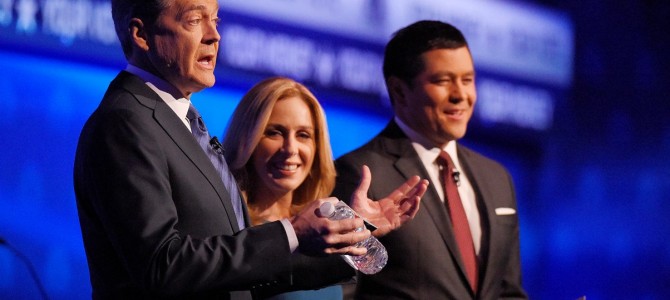
So it’s nearly unanimous: basically the only Republican in the country who felt that the CNBC debate moderators were fine is the guy at single digits in New Hampshire who got an outsized amount of airtime. Pretty much everyone else? Not so much. Including, thankfully, Reince Priebus who called the debate a “crap sandwich” on Sean Hannity: “Everything is going to be reevaluated and reset, every debate on the calendar is going to be reevaluated and reset, look at the format, the moderator, everything. We will have meetings with all the candidates to make sure that what went on last night does not happen again.”
He’s moving in response to inevitable pressure from the top campaigns on this front to fix things in the short-term. After the debate, Byron York reported on the campaigns moving toward some organized agreement about what reforms to the process were necessary. Politico furthers those reports today, detailing the campaigns meeting together to discuss potential rule changes. In addition to Trump and Carson, most of the rest of the field is interested in changing things up – the lower portion want to use early state polling or split the field in half at random between two segments, extending the time for answers, and other format shifts.
But Priebus’s promise here is significant, and I’m glad he’s making it. He will need to live up to it, and primarily that means the RNC will need to exercise a firmer enforcement of their prior rules. This is most important when it comes to the moderators of the debates – no more moderators from the John Harwood hack faction of the media. They should also require real presence and engagement from conservative media partners for non-Fox debates. The engagement in the NBC/Telemundo debate by National Review, the CNN debates by Salem, and particularly the ABC debate with IJ will all need to see stepped up roles for the partners – a greater share of questions, and on more serious topics. CBS currently has no conservative media partner, but it does have John Dickerson, the most eminently fair moderator on the list.
Leverage in the Long Term
Of course, moderator and format shifts are short term solutions – the real problem here is one of leverage. To solve it in the long term, Transom reader and Bob Goodlatte Chief of Staff Charlie Keller suggested an idea to me that would be incredibly disruptive in future electoral years: perhaps Reince had the right idea about improving the process, but got the order wrong.
Once CNBC was given a debate, they weren’t interested in finding a conservative media partner. Organizations had to go and convince them to partner, as opposed to the other way around. They knew that the RNC had, at the point of giving them a debate, given up all leverage in forcing them to do anything – you’ll take Larry Kudlow’s one question in the undercard debate and like it.
But what if instead of picking the channel and then allowing them to select the partner, the RNC picks the partner first, and the channels must then bid on the opportunity to put on the debate?
Practically speaking, the RNC would retain some control of the process; it would give the National Reviews of the world a money boost from the channels; the TV channel would get the ad revenue; but all the while, it would ensure right of center media outlets are actually in control of how the debate will work. They can demand certain panelists, topics, etc. as contingencies of cutting a deal, and work with the hosts and networks who offer them the best deal.
There’s no rule or principle that would prevent an approach like this – except for the fact that practically speaking, TV networks would go absolutely ballistic. Outside of this period of primary debates, elected Republicans and the party spend most of their time begging for attention and fair coverage. They suck up to the media like mad to get better coverage, cultivating relationships with network talent, producers, and executives. Alienating them is anathema to GOP communications staff.
Salute Your Solution
Except… this is a time of major disruption in the way people access and watch these debates. Think about how much more true that will be four years from now. CNBC’s debate drew 14 million viewers, well short of the 24 million at Fox and 23 million at CNN. Last week 15 million people watched Bills v. Jaguars on Yahoo streaming. The plethora of non-traditional channels available to the candidates to achieve similar reach in four years will be more than any prior presidential campaign.
A debate on Yahoo, on YouTube, on Netflix is absolutely a possibility in 2020 and could be used as leverage against the traditional networks. There is no reason to reward networks who want to set up Republicans to fail, and who maintain that this unserious cast of media characters are balanced journalists asking tough questions. There is no reason the Republican Party should continue to buy into the fiction that John Harwood is the same as Tim Russert.
This is a time of general disruption of all sorts of traditional institutions and processes. Truly disrupting the debate process requires more than just getting more conservatives in the chairs asking questions. It may require taking the hard step of giving the authorities at the CNBCs of the world, who knew exactly what they were doing when they set up this debate and chose the questioners, the respect and deference they deserve: none.









